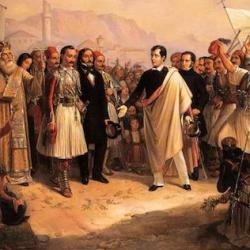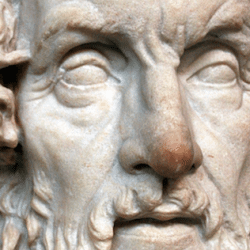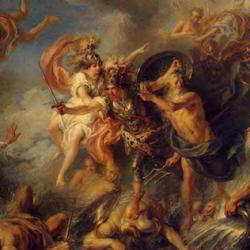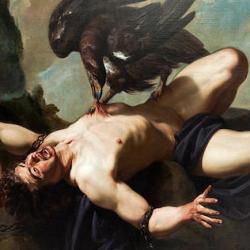Discussing the religious origins of Athenian tragedy in her recent Tragedy and Athenian Religion , Christiane Sourvinou-Inwood first examines the early forms of the festival of the City Dionysia. She points out that “tragedy” comes from tragos , a male goat, and that the first hints of tragedy arise in the hymns that accompanied the sacrifice of a goat at the City Dionysia. At the center of the whole festival performance was the welcome of Dionysus (symbolized by a procession of phallic symbols) to the city center, but this welcome was preceded by resistance to Dionysus, as it was in many myths (cf. Pentheus in Euripides’ The Bacchae ). Dionysus was seen as a dangerous god, especially by those who held power; the coming of Dionysus meant disorder and the loss self- and civic control. Paradoxically, though, order was established not by resisting the god but by welcoming him, for Dionysus was, as Sourvinou-Inwood puts it in a nice phrase, “the teacher of controlling the loss of control.” This applied to both sexual activity and the use of wine. Dionysus brought wine, and if one resisted, he would lose control; if one accepted and submitted to the god of wine, then the disorder of wine could be ordered. Men could learn to stay upright (ORTHOS) if they submitted to the god. Likewise, according to the myths, anyone who resisted the sexual disorder of Dionysus would lose sexual control and fertility; but those who submitted to the god could control the loss of control. They would be able to remain sexually upright (ORTHOS), that is, erect. (Sourvinou-Inwood points out that “ORTHOS” is sometimes used to describe a phallus held upright during a Dionysian festival.)
Originating in this matrix, with these issues in play, tragedy arises as a mode of religious exploration, particularly as a mode of exploring the paradoxes of order and disorder, and the unknowable and uncontrollable character of the gods. It should also be said that this account makes it clear that mythical, dramatic, and political issues are all in play at the origins of tragedy.















